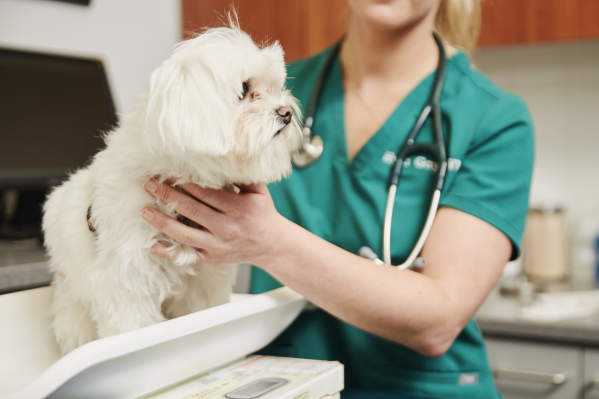Does your dog seem sick? Are they hurt, or acting different? If so, you may be wondering if you should call your veterinarian — but fear being labeled a helicopter pet parent. But the truth is, you should have no fear when it comes to taking care of your fur baby’s health.
How Do You Know If You Should Talk To A Vet?
So how do you know if you should call the vet? “If you’re asking yourself that question, you should be calling your vet,” says Leanne Lilly, DVM, behavioral medicine resident at the Ohio State University in Columbus. “Your pets are your family members, you know them very well. So if something is different or has changed, it needs to be discussed.
Signs You Need To Talk To A Vet
If you’re still on the fence about calling your vet, consider whether your pup is experiencing any of these symptoms:
1. Changes in behavior
“Very often, the first signs of illness are behavioral,” explains Dr. Lilly. “For example, if your dog is bumping into objects, missing when jumping, or growling when they don’t normally do, it’s time to call your vet.”

2. Vomiting
According to the American Kennel Club (AKC), occasional vomiting is not all that unusual in dogs — I should know, as my dog will get sick just from drinking water too fast. However, it becomes a concern if your dog is frequently vomiting, or vomiting blood — or if your pup is experiencing vomiting along with other symptoms.
“If it’s retching that’s not productive, that can be a sign of a serious gastrointestinal problem, so you should definitely see your vet,” adds Lilly.
Read More: Dog Throwing Up? What To Do When Your Dog Is Vomiting
3. Dog diarrhea or other changes in stool
When you take your dog out for a walk, pay attention to what you’re picking up — as changes to their stool can signal if they’re experiencing any health issues. Call your vet if notice your pup has:
Diarrhea
Hard, dry stool
Dark, tarry stool
Blood in the stool
Worms
Mucus
Difficulty going to the bathroom
Read More: Dog Has Diarrhea? What Causes It & How To Stop It
4. Eye issues
Is your pup pawing at their eyes? If you notice eye redness, cloudiness, or an increase in discharge, your dog may have an infection or injury and should be evaluated by your vet. A good rule of thumb: If one eye is affected, it’s likely an infection or injury; but if both are infected, it’s likely due to something like allergies.
5. Changes in appetite
While skipping an occasional meal is not unusual, if your pup goes two days without eating, you should call your vet. Likewise, if your dog is hungrier than usual and begging for more, you should get them checked out.
6. Excessive thirst
If there’s an explanation behind your pup’s increased water intake, like after a romp at the dog park or on a particularly hot day, that’s one thing. But if excessive thirst persists longer than a day, call your vet.
7. Lethargy or weakness
It’s normal for your pup to be a couch potato some days. But if they seem overly tired or weak, or become disinterested in playing or taking a walk (or treats!), and this behavior lasts more than two days, it’s time to call the vet.
8. Limping
Even if it’s just because Fido played too hard at the park, it’s always a good idea to have symptoms like lameness or limping checked out to make sure there’s not an underlying injury that needs medical attention.
9. Scooting
No one wants their dog wiping their bum on the floor — and the truth is, if you notice your dog scooting, they should get checked out. Scooting may be a sign that your pup is experiencing something like worms, an anal gland problem, or issues with bowel movements.
The Bottom Line
When in doubt, just give your vet a call. “It may not be an emergency, and that’s ok,” says Lilly. “If your dog has one green booger in their eye, they likely don’t need the ER, but you should still have a conversation with your vet and get it evaluated.”
And don’t wait — the earlier you call, the better it is to both ease your mind and get your fur baby the care they may need. “We would much rather see something early and determine that it’s nothing,” emphasizes Lilly.
Remember: You know your pet best, so if they’re experiencing something new or acting different, pick up the phone and call your vet.
